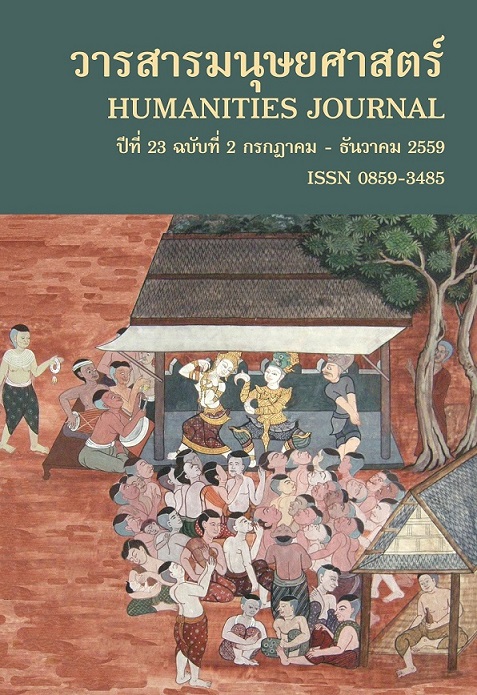Translation of Sexual Innuendo in King Vajiravudh’s Translated Version of William Shakespeare’s Plays: From Performances to Literary Studies
Main Article Content
Abstract
King Vajiravudh translated Shakespeare’s The Merchant of Venice in 1916 followed by As You Like It in 1918 and his translation of Romeo and Juliet was first published in 1922. One of the most interesting points is his translation of Shakespeare’s sexual innuendo. It is very difficult for a translator to retain the sense of humor, vulgarity, or compassion connoted in the original texts. Sexual innuendo is a kind of pun which is a complex and diverse phenomenon. The study finds that, in his translation process, King Vajiravudh tried to keep the original meaning, and his choice of Thai terms to equate to the intended English meaning is excellent. However, the degree of severity of translated bawdy words is sharply lessened, and he occasionally chose not to translate the sexual puns possibly due to the cultural differences between the source language and the target language, the untranslatability of complex double entendres or their inappropriateness for the royal court. Moreover, loan words were frequently used to explain sexual innuendos with full explanation in the glossary. It can be assumed that the intended effect of double entendres in Shakespeare’s famous plays is lost in translation. It can be concluded that the translation of Shakespeare’s plays by King Vajiravudh is a significant revolution of literary studies in Thailand that was chiefly influenced by the western literary tradition because a play is used not only for performance, but also for literary studies.
พระบาทสมเด็จพระมงกุฎเกล้าเจ้าอยู่หัวทรงแปลบทละครของวิลเลียม เชกสเปียร์สามเรื่องคือ เวนิสวานิช ในปี 1916 ตามใจท่าน ในปี 1918 และ โรเมโอและจูเลียต ในปี 1922 ประเด็นที่น่าสนใจในการแปลบทละครทั้งสามเรื่องของเชกสเปียร์คือการแปลคำส่อนัยทางเพศ คำส่อนัยทางเพศเป็นการเล่นคำอย่างหนึ่งที่มีความซับซ้อนและหลากหลาย จึงเป็นงานยากสำหรับนักแปลที่ต้องรักษานัยแห่งความขบขันที่ปรากฏอยู่ในต้นฉบับ การศึกษาพบว่า ในกระบวนการแปล พระบาทสมเด็จพระมงกุฎเกล้าเจ้าอยู่หัวทรงพยายามรักษาความหมายของต้นฉบับให้มากที่สุดเท่าที่ จะเป็นไปได้ผ่านการสรรคำ ทว่าความรุนแรงของคำถูกลดทอนลง บางกรณีทรงละการแปลคำส่อนัยทางเพศ ซึ่งอาจเกิดจากความแตกต่างทางวัฒนธรรมระหว่างภาษาต้นฉบับกับภาษาแปล จากความซับซ้อนลึกซึ้งของการเล่นคำ หรืออาจเกิดจากความไม่เหมาะสมของคำส่อนัยทางเพศกับธรรมเนียมของราชสำนัก นอกจากนี้ทรงยืมคำภาษาต้นฉบับมาใช้และทรงทำอภิธานศัพท์อธิบายเพิ่มเติม อาจกล่าวได้ว่า กลวิธีการแปลเช่นนี้ทาให้อรรถรสของคำส่อนัยทางเพศในภาษาแปลหายไป ลักษณะดังกล่าวนี้นาไปสู่ข้อสรุปว่า พระบาทสมเด็จพระมงกุฎเกล้าเจ้าอยู่หัวมิได้ทรงแปล บทละครของวิลเลียม เชกสเปียร์เพื่อนาไปแสดงเป็นละคร แต่เพื่อใช้ในการศึกษาในฐานะวรรณกรรมเช่นเดียวกับที่ปรากฏในโลกตะวันตก จึงกล่าวได้ว่าพระราชนิพนธ์แปลบทละครของวิลเลียม เชกสเปียร์ทั้งสามเรื่องเป็นการปฏิวัติวรรณกรรมศึกษาของไทยอีกวาระหนึ่งโดยได้รับอิทธิพลจากแบบแผนวรรณกรรมศึกษาของตะวันตก


